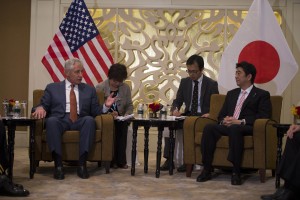In Singapore, the Shangri-La Dialogue reflected tensions in Asian security
By Kamila Pieczara, PhD student in Politics and International Studies (PaIS), Warwick University2002 was a year of crisis between Pakistan and India, which almost resulted in war.[1]

This was also the year of the first Asia Security Summit, convened in Singapore by the London head-quartered International Institute for Strategic Studies (IISS): the Shangri-La Dialogue. The IISS chief executive Dr John Chipman informed the audience in that year’s Dialogue about the connection between the Indo-Pakistani conflict and the summit’s mitigating role, showing that summit diplomacy can mean more than simply words to be forgotten. Apart from the role of the Shangri-La Dialogue in appeasing the Indo-Pakistani conflict, another example he quoted was of the IISS’s Middle East Manama Dialogue 2013, where Chuck Hagel promised to foster links with the Gulf Cooperation Council countries, and followed up on that task in 2014.
A specific dialogue at the Shangri-La emerged between the Chinese People’s Liberation Army General Wang Guanzhong and the U.S. Secretary of Defence Chuck Hagel, and between the Chinese representative and Japan’s Prime Minister Shinzo Abe. China took note of the indirect messages aimed at it in Shinzo Abe’s speech at Shangri-La, which approved of the ‘rule of law at sea’, and of the direct messages in Hagel’s statement: that the United States will “not look the other way” in response to China’s “unilateral” actions. Furthermore, General Wang noted that Japan, in Shinzo Abe’s speech, went against the “spirit” of the Dialogue, by indirectly criticizing China. Wang’s responses came in his speech on Sunday, 1st June, while Abe’s speech took place on Friday (30th May) , and Hagel spoke on Saturday (31st May).
While many reports focus on the interaction of Gen. Wang with Prime Minister Abe and Chuck Hagel, it would be unbalanced to portray three intensive days as containing only one dominant theme. Notable was also the French defense minister, Jean-Yves Le Drian’s speech, in which he drew lessons from the French engagement in Africa for their possible application in the Asia-Pacific region. Of further note was also the discussion on crisis management in the region, with reference to the missing plane of Malaysian airlines (MH 370). Another Asia-Pacific power to participate was Russia, represented by the deputy defence minister, Anatoly Antonov, who curiously fell short of including Ukraine in his prepared remarks, and chose to elaborate on the so-called “colour revolutions” of the Middle East and North Africa.
What could we have expected from this year’s Summit? It would be refreshing if China took home the message that some rationale underpins the generally critical reception of its actions, and a mixed reception of Gen. Wang’s speech, which was followed by a multitude of remarks from the audience. If China instead perseveres on the course of collision, on which it is now, then its Shangri-La speech will be a true reflection of its actual position.
China is now in a serious spat over the Senkaku Islands (in Japanese)/ Diaoyu (in Chinese), and is also in conflict with Vietnam. China placed an oil rig recently in disputed waters. That other Asian countries, especially in Southeast Asia, seem to welcome Abe’s promise of Japan’s increased participation in dealing with those security issues should come as no surprise. Why is China surprised by such a course of events? What would China expect of Japan: to completely withdraw from voicing its position on regional affairs? That is unrealistic. Japan will certainly not guard other states’ interests, if this is what China fears. Instead, a more intensive Japanese participation will lead to more balance, which is needed for smaller countries that cannot shape events on their own. Of course, China’s position is to some extent understandable. If it acted according to international law, as it stands, it is likely to lose its claims. This was rightly observed by Singapore’s Defence Minister, Dr Ng Eng Hen, in his closing address at Shangri-La on the 1st June.
It would be over-optimistic to expect that a summit could change the course of events. This year’s Shangri-La Dialogue was a rather faithful portray of tensions which haunt the region, and added to these were the many divisions that have spread throughout maritime Asia. While the Shangri-La Dialogue witnessed many reproaches of major nations vis-à-vis one another’s behaviour, it is indisputable that these open statements served transparency and an exchange of information, rather than the escalation of conflict. Next year, and in the years to come in Singapore, it should be possible to say whether the interaction of Asian powers, ASEAN members, and external actors, led to any betterment in Asian disputes and tensions overall.
As the opening dinner and Abe’s speech at the 13th Shangri-La Dialogue was attended by Lee Kuan Yew, Singapore’s first prime minister, the long history of Singapore’s place at the heart of Asian diplomacy became clear. Many tensions will persist, but efforts such as this security summit bring some peace to the troubled region.
No comments:
Post a Comment